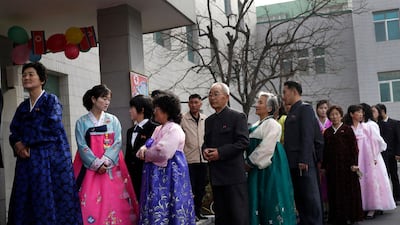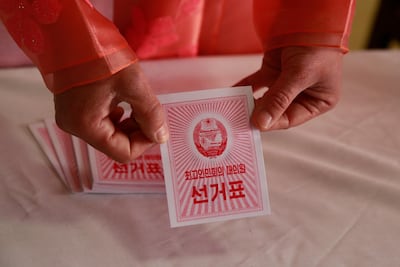North Koreans will vote in jubilant elections on Sunday in which they only have one choice, for a rubber-stamp legislative body.
The vote will be celebrated by state media as a joyous occasion, in which nearly 100 per cent of citizens will endorse the single candidate on their ballot paper, a show of national unity, the leadership says.
"The election will strikingly manifest the fixed will of our people to firmly trust and uphold to the last Supreme Leader Kim Jong Un despite storm and stress," the ruling party's official daily said in a commentary on Sunday, the Associated Press reported.
"All the people have to fully display through the election the invincibility and might of the DPRK advancing by dint of the single-minded unity," it said, using the acronym for the country's official name, the Democratic People's Republic of Korea.
But beyond a box-ticking exercise, the vote also acts as a consensus, giving some insight into the numbers of defectors, and a way to reward rising stars in North Korean politics or dispose of officials who have served their purpose.
After voting, citizens will join jubilant crowds dancing to live music celebrating the renewed mandate.
The Supreme People's Assembly rarely meets and has no legislative capacity, simply rubber-stamping policy made by the Korean Workers Party.
But the local representatives provide a valuable feedback mechanism for the central government, acting as eyes on the ground reporting issues with waste disposal, water or roads.
"As a deputy my main job is to take care of problems that come up with my constituents, like water problems or food," Jo Kil Nyo, a candidate seeking re-election, told the Associated Press. "If I can't resolve something, I take it to the assembly."
North Koreans over the age of 17 will vote in nearly 700 constituencies for the Supreme People's Assembly. They will have a single name on a ballot paper, which they will place directly into a ballot box, without marking the paper.
Dissent or disapproval of the state-sanctioned candidate is possible by striking out the name on the ballot, but would almost certainly result in repercussions.
While there's only one choice on the ballot paper, there is a plurality of parties within the Supreme People's Assembly, the biggest, of course being that of Supreme Leader Kim Jong-un, the Korean Worker's Party.
All parties form a unanimous coalition of the Democratic Front for the Reunification of Korea.
Turnout is expected at near 100 per cent. In 2014, the first election since Mr Kim took power, turnout was recorded at 99.97 per cent, the 0.03 percent abstention attributed to those sick or working overseas.
But officials say they made it as easy as possible for everyone to vote – providing "mobile voting" for the elderly or sick, keeping polling stations open late, and setting up hundreds across the country.


